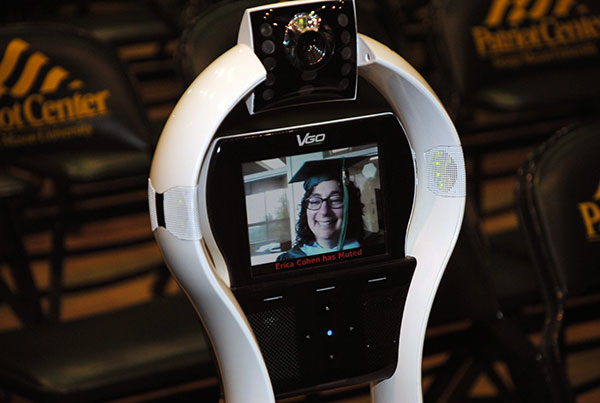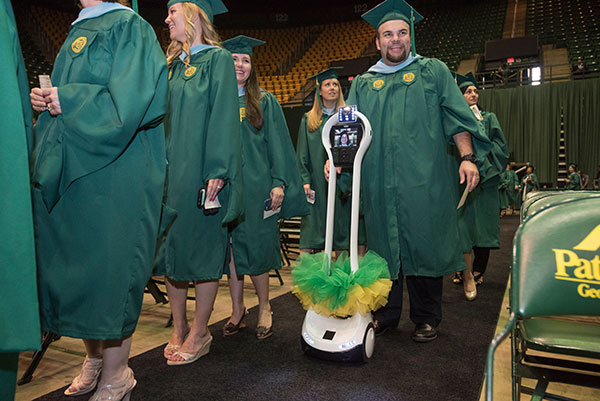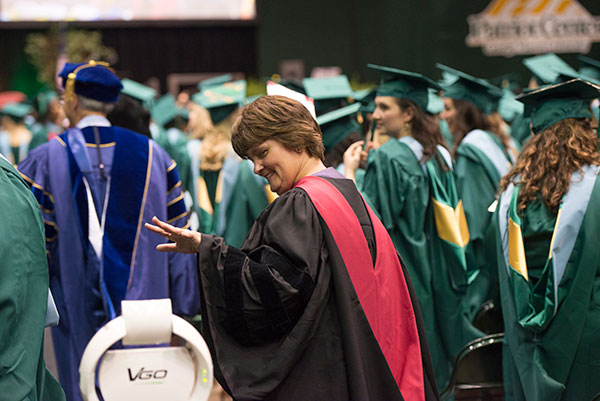Graduating Student Attends Convocation Via Robot
June 22, 2015
Video segment from DC News FOX 5 DC WTTG.
Like her fellow graduates, Erica Cohen was excited to wear her green cap and gown to her George Mason University convocation this spring, and to gather with friends, move down the aisle, and watch the event unfold.
Unlike them, Cohen did all this from 250 miles away, with the help of a four-foot-tall robot.
For the past two years, Cohen had been part of a cohort of Fairfax County, Va., teachers working on Special Education degrees at George Mason. She’d looked forward to graduating with her peers, but nixed those plans when she found out her daughter was graduating from Virginia Tech the same day.

With cap and gown on, Erica Cohen attended her convocation from Blacksburg, Va., using Mason’s VGo robot. She practiced ahead of time maneuvering the robot around the Patriot Center so she could do everything her classmates did at graduation—except walk across the stage. Photo courtesy of Grad Images.
Margaret Weiss, an assistant professor in Mason’s College of Education and Human Development’s Graduate School of Education, suggested Cohen attend graduation using the school’s new VGo robot. Purchased two years ago for the school’s Assistive Technology Lab, the device is operated remotely by laptop or iPad through a Verizon network. Users move it around with a keyboard or mouse, and interact with others through an onboard computer screen and microphone.
Cohen had to practice a while before she could operate the VGo.
“I was a little nervous,” she admitted. “The first time I practiced, I scared somebody. I moved it into a dark classroom and said, ‘Hello, is anybody there?’ And I heard this scream.”

The robot was dressed for the occasion in a green and gold tutu. Fellow grad Andrew Orenstein kept a watchful eye on the device during the ceremony. Photo by Alexis Glenn.
On graduation day, Cohen logged in from the Virginia Tech library, while at Mason, fellow grad Andrew Orenstein lifted the robot over stray wires and stayed close by in case of problems. Cohen had a great view from her “seat” in the aisle, and could even zoom in to see the stage.
Originally designed to help doctors remotely visit patients, VGo robots are now used in many places, especially classrooms where homebound children need to attend class virtually.
Aside from Cohen, other Mason students have used it to attend class, with reasons ranging from broken bones to new babies.

Anne Holton, Virginia's Secretary of Education, waved hello to Erica Cohen as she processed to the stage. Secretary Holton was the featured speaker at the convocation ceremony for Mason's Graduate School of Education. Photo by Alexis Glenn.
Being able to move the device proved especially useful for one student who relocated to Canada, said Kristine Neuber, an instructor and Assistive Technology Lab manager for the Helen A. Kellar Institute for Human disAbilities. When the class broke into small groups, Neuber explained, “She was able to walk over to her group and be a part of it, as opposed to being up on some big screen somewhere in the room, like in typical videoconferencing.”
Weiss used the robot when doctoral students taught a class of hers while she was at a conference.
“It was their first opportunity teaching,” she said, “so I came into class on the VGo, watched what was going on, and gave them feedback.”
The VGo’s relatively inexpensive price of $6,000, plus $1,000 per year for maintenance, was paid for with a grant received by the Kellar Institute. The institute is hoping to expand the use of the VGo in school-based research.
Using the robot, Cohen said, was a great way to “put out there how assistive technology can make such a difference for a student.”
As a teacher in Fairfax County, Va., she noted how one of her students would benefit from this device, since he is often too weak to come to school.
“It was fun for me,” she said. “But it seems essential for kids who can’t be in school for whatever reason.”
The VGo robot is available to Mason students, faculty and staff. This video shows how it works. For more information, contact Kristine Neuber at kneuber@gmu.edu.
This article was written by Cathy Cruise and appeared on Mason News.
For additional information:
- CEHD Communications: cehdnews@gmu.edu
- Graduate School of Education: gse.gmu.edu
- Special Education program: gse.gmu.edu/specialed
About the college:
George Mason University's College of Education and Human Development (CEHD) includes two schools: the Graduate School of Education, one of the most comprehensive education schools in Virginia, and the School of Recreation, Health, and Tourism. CEHD offers a full range of courses, certificates, and degree programs on campus, online, and on site to more than 4,000 students each year. CEHD is fully accredited by NCATE, and all licensure programs are approved by the Virginia Department of Education. George Mason University, located just outside of Washington, D.C., is Virginia's largest public research university.
Follow CEHD on Facebook at www.facebook.com/MasonCEHD or Twitter at @MasonCEHD.
